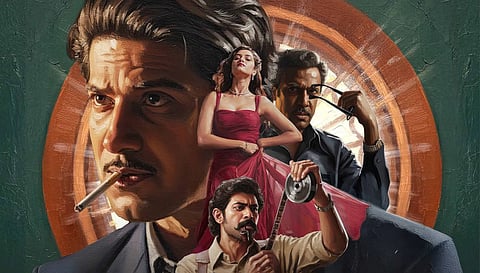

Kaantha (Tamil)
Director Selvamani Selvaraj’s Kaantha attempts to examine the dangerous egos that have shaped and destroyed superstars across eras. Though the makers insist the film is not directly based on veteran Tamil icon MK Thyagaraja Bhagavathar, there is an episode from his life which makes you associate it with him.
The film unmistakably borrows fragments from the lives of many larger-than-life figures whose off-screen flaws have become part of cinema lore.
Set in the 1980s, the period drama follows the simmering rivalry between superstar TK Mahadevan (Dulquer Salmaan) and his guru, celebrated filmmaker Ayya (Samuthirakani). Mahadevan rises to fame by intuitively understanding what his audience wants, while Ayya defiantly clings to the sanctity of good writing and refuses to dilute his artistic ideals. Their clashing philosophies and Ayya’s inability to adapt to changing tastes ignite a deep conflict.
Both individuals come together to redo a dropped film, the director’s dream project. However, TMK exhibits his now-gained power and popularity to make amends to the script, including changing its title from Saantha to Kaantha to suit his hero image. The script of Saantha and the film Kaantha mirror each other, offering fantastic drama.
Caught between them is Kumari (Bhagyashri Borse), an earnest newcomer and Ayya’s disciple, who naively tries to mend their fractured relationship.
Kaantha begins as a gripping whodunit, drawing viewers into its world with confidence. The first half is executed with flair, rich in drama and steeped in nostalgia. Lavish sets, meticulous production design, and evocative cinematography recreate the mood of the ’80s, complete with nods to real incidents that once dominated the headlines.
The sets, costumes, camera work, performance, and writing transport you to the 80s.
It is in the second half that the film wobbles. The writing loses steam, the pacing slackens, and the mystery, which initially promises intrigue, unravels into a dull investigation. Suspects are introduced without purpose, motivations feel thin, and the twists fail to land. The narrative begins stretching itself to fill time, exposing its structural flaws. You can see the filmmaker struggling to prolong the drama.
Yet the film redeems itself to an extent with a thought-provoking climax, reflecting how a gift can slowly, insidiously become a curse.
Performances are Kaantha’s strongest pillar. Dulquer Salmaan delivers one of his finest roles, fully embracing the vanity, charm, and contradictions of a superstar shaped by adulation. Bhagyashri Borse is a revelation, matching Dulquer’s intensity and embodying the heightened emotional register of the ’80s cinema world. Samuthirakani is perfectly cast as the uncompromising auteur. Cinematographer Dani Sanchez-Lopez, who worked in Mahanati and Virata Parvam, produces another stunning piece of work. Music by James Bejoy is another asset to the film.
Despite its uneven writing, Kaantha remains an absorbing exploration of ego, ambition, and the fragile balance between art and image. The film’s best moments are powered by exceptional performances and a nostalgic cinematic universe brought vividly to life.
Disclaimer: This article was not paid for or commissioned by anyone associated with the film. Neither TNM nor any of its reviewers have any sort of business relationship with the film’s producers or any other members of its cast and crew.